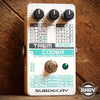- tap tempo from two measures to 16th notes.
- 9 LFO shapes
- 22 preset sequences.
- stereo panner (requires Y – splitter cable on output.)
- tremolo effect turns all the way off at max depth.
Feature rich Stereo Tremolo/Sequencer that keeps it simple.
The TremCoder gives you options but won’t require a masters degree in modular synth madness to operate. A variety of LFOs drive a stereo tremolo/panner and lock into your groove with tap tap tempo.
But wait, where’s the tap tempo switch? External input? Nope. You just tap the bypass switch twice and the tremolo starts on the following beat. Tap up to five times for greater accuracy. When tapping stops the effect turns on like magic. After two seconds simply press the switch once to turn the effect off.
How does stereo work with only one ouput jack? You’ll need a TRS Y cable for stereo panning.
Controls:
Depth: Controls the effect depth.
Speed: Selects ratio for tap tempo in LFO modes. Selects sequences in sequence modes.
Shape: There are 9 LFO shapes and 2 sequence banks
Short Pulse: Shorter on time than a square wave. 33% on time.
Square: Same as Pulse but on 50% of the time.
Long Pulse: longer time than a square wave. 75% on time.
Sine wave: The classic modulation waveform for a tremolo effect.
Triangle: Similar to the sinewave. Less “throb” or “bounce.” Especially useful for a wide panning effect.
Ramp / Saw: It’s like half triangle and half square.
8 Step / 16 Step: These are similar to sequences, but particularly useful for panning.
Sequences: Individual sequences are set by the speed knob and all have fixed ratios.
Bank A: 1-3 are simple LFOs modulated by another LFO. For example Bank A Seq. 1 is a sine wave with the amplitude modulated by a slower triangle wave. This makes the tremolo effect fade in and out over four beats. A5 – A11 are simple rhythmic patterns. A10 and A11 are timed with triplets.
Bank B: All 32 step rhythmic patterns that repeat over a four beat measure. Unlike Bank A, these are not depicted on the pedal.

